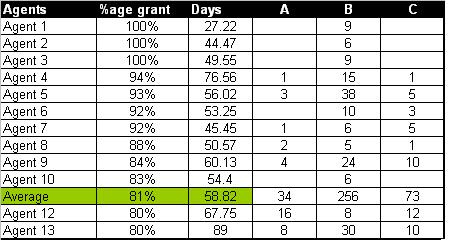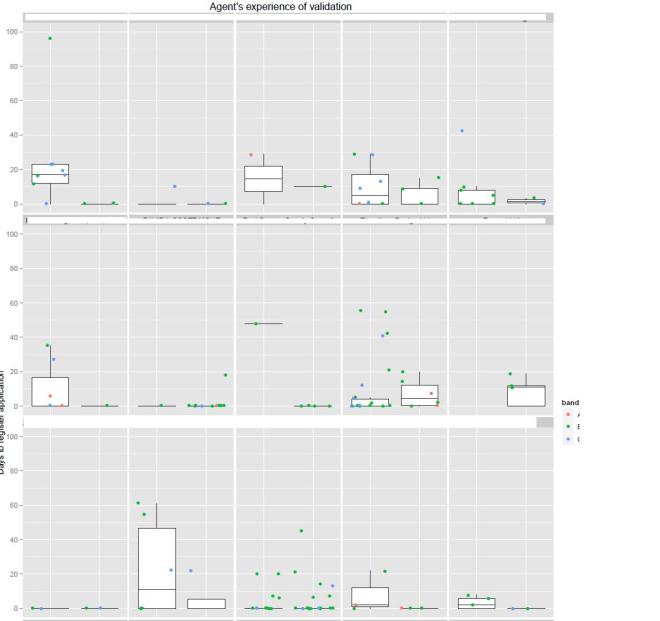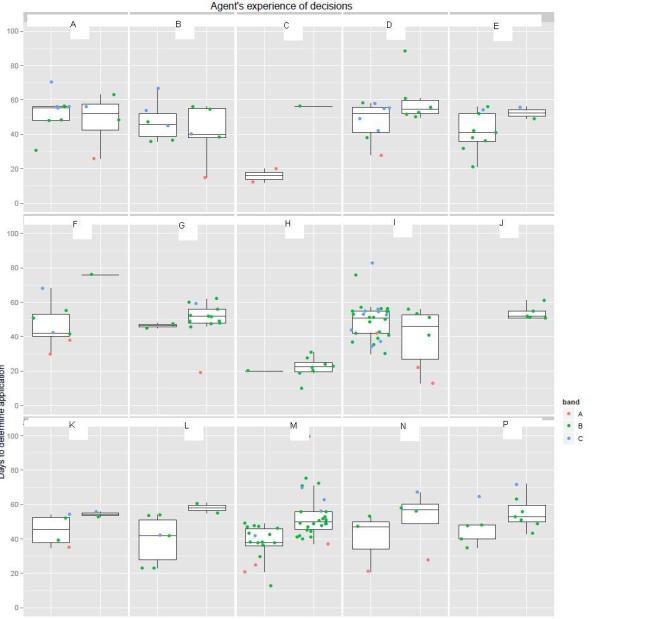‘…how much responsibility for agent’s poor performance lies at the council’s door – are we managing services that reward agents that do the wrong thing’?
Some agents are great. Others not so great. The poor ones submit shoddy schemes that require rework – and the cost of that rework is presently paid for with public money. [as an aside, if local fees happen, that rework will be paid for by the good agents. But that’s for another day.]
Earlier this year I wrote a piece asking if publishing data on how quickly and successfully different agents get planning decisions would lead to better quality applications. It’s an uncomfortable way of looking at the world – it’s a council’s-eye view, it bashes agents and leaves councils unaccountable for their part.
A better (balanced) picture
I have, instead, decided to look at the world from the customer’s (agent’s) end. I’ve asked: What’s my experience working with different councils? Do I have to play by different rules each time? Why does council ‘A’ decide my application quicker than council ‘B’?
What we’ve done
Taking data from some neighbouring district councils we’ve looked at processing times and success rates of agents that have submitted 10 or more applications across the councils. And, because not all work is equal; we have grouped similar work into 3 bands (A=quick/easy (certificates, NMAs), B= more complicated (minors, householders, C= Difficult (Majors etc.). We can now compare agents that do similar work and their experiences of working with different councils.
What we’ve found
The agent-centric view – no surprises; there are good and bad agents!?
[Notes: This is a list of agents working across a pair of District Councils. The ‘Days’ is total end-to-end days taken to receive a decision and the numbers across A-C are the total number of decisions within each band. If you were a punter choosing an agent who would you call first ?]
Question 1: if some agents can get things through quickly and successfully, why can’t they all?
Question 2: Which agents get quick permissions (and do they provide a service for my ‘B’ type application?)
Question 3: Is the difference down to good/bad agents or good/bad/ processes?
Same agent, different story
This box plot compares validation and decision days at two different (neighbouring) councils.
Question 1: Why does this agent experience a difference?
Question 2: The application going through Place A ‘catches up’ when you compare the Decision days. Is there something these councils can learn form each other that has nothing to do with the agent?
Question 3: Is anyone bothered about validation taking twice as long if the decision is reached earlier?
As an applicant interested in a quick decision, it would be difficult for me to confidently choose this agent over another. I would rather choose which council my application got submitted to (!)
All Agent view
The box plot within each picture represents the agent’s (A – P) experience at two different places.
Validation times
Same set of agents – decision times:
This is where it gets really muddy or clear depending on what way you look at it. Agents get similar levels of validation sometimes, a few experience something like consistency in the time to decision, and almost invariably the council that validates slowest, issues decisions quickest. What is more important? What costs more?
So what? Where are we going with all this?
You tell us. Who cares about this? We can demonstrate how clever we are by producing interesting pictures but why bother if all it amounts to is an interesting project? We are not interested in rides that have no destination. Here are the options.
The ‘nuclear’ option
Stack agents one on top of the other, publish the facts and let the market decide who to use. Quick, easy, not customer friendly, creates enemies and most scarily, might mean some agents no longer receive work.
The customer-centric option
Classic customer focus; understand the customer experience, act on the bits that I (the council) am responsible for, and, by taking this act of ‘leadership’ seek to influence and change the bad behavior of your customers (the agents). Councils improve, agents improve and overall things get better.
Both of the above options are real and possible. The first is unpalatable, and the second lacks ‘bite’ – councils have agent forums to deal with these sorts of issues, and yes, this data may help them target their conversations, but will things change significantly unless we know whether this is hurting us or not’ ?
The ‘Stellar’ moment
What is the cost saving if the poorest 30% of agents could be as good as the best 30% of agents ? Councils taking the lead and improving their end is absolutely the way to start influencing change among agents. But, and I am also absolutely convinced of this, that unless we can put a ‘£’ sign next the additional work that poor agents/processes cost us, it will be hard to get anyone to do anything significant about this.
So what’s next?
You tell me – I mean it. I am going to continue fine tuning the work to date with our council group and most importantly try and create the £ sign for all of this.
My next installment will be the one that tells us if we have an interesting project or something that will force some widespread change.
If you would like to see / hear more about this work or can help me make it better, let me know.





Yes very interesting but some applications are more difficult than others. Under the current rules I will not turn away a client who has a controversial proposal but if my success rate with planning becomes material then i have to reduce the service I offer and the system wins again. I think that it is necessary to test the system or it becomes complacent.
I find it intersting that validation can be achieved by some council / agent combinations on the day of submission. My record is validation just before the end of the eighth week on a simple application which did NOT need additional or adjusted information to secure validation. the same authority has today advised that it has managed to open an application submitted over a fortnight ago. At least this is progress.
Martin
I’d certainly be interested in hearing more. We are looking to implement an Accredited Agent Scheme but I’m concerned this will not tackle the problem. We have a significant number of agents who have never yet had an application validated first time round – and they submit a significant number of applications each year. I’ve thought about publishing league tables on our web site – but have never been brave enough to do it. Do you have examples of other authorities that do?
I find those which take the most time to validate are from householders who are trying to submit the applications themselves. These are usually for the small applications such as fences, outbuildings, solar panels, satellite dishes etc. Mostly these are sites in CAs or listed buildings and people don’t want the added expense of employing an agent/draughtsman. These take far more time to get a valid application than for a much more complex/major application which is submitted by a competent agent.
Interesting stuff – I think all of us working in LPAs could probably list the better and worse agents we deal with on a regular basis – indeed, in our office we regularly discuss one particular large local(ish) planning agent with regards to them failing (yet again) to meet the professional standard that should be expected of them (if we were to show such disregard for professional standards we’d find ourselves out of a job very quickly).
One thing this research doesn’t seem to take account of, however, is that within band A, band B and band C there are easier and harder applications. A Major which complied with policy on a site the Council had prepared a planning brief for would be very straightforward compared to a Major that didn’t comply with policy on a site the Council had declared should remain undeveloped until the end of all time…
I also get the impression that some agents are more likely to take on those more difficult cases – perhaps because they’ve been successful in bulldozing them through previously (perhaps by bamboozling an inspector into accepting some spurious caselaw at appeal…). I’m also very aware that this applies to plan making processes as well as planning applications – I’ve lost count of how many times of the years we’ve commented in our office that an agent is basically taking a client for a ride (at the client’s cost) by making representations on their behalf when there is no hope whatsoever of what they seek being taken forward.
Martin
Like Julie I would be interested in hearing more. At King’s Lynn we have considered the same approaches as Julie but never really taken it forward in any structured format. I know we have good and not so good agents and for a good while now I have felt that agents that sumbit invalid applications should pay an additional cost for any extra work we have to carry out, hits the agents profit margin or they have to go back to the applicant and request more money, either way it not good for the agent.
Walsall Council are running an Accredited Agents Scheme, see website. I have yet to make contact with them to see how successful it has been but certainly an option I am looking at.
Ok so today after two weeks of waiting for the LPA to open the application I have been told that it is invalid because there is no Heritage statement.
Mea culpa.
except the application is for internal fitting out of a part built shell to an alternative use. No material external variations to the approved design. I have spoken to the validation officer who confirmed that a single sheet of paper headed ‘Heritage Statement’ and recording that there are no heritage implications would enable validation……
Now I think about it I did not submit a bat survey – i just hope they do not notice.
From my side of the fence I see LPA’s delegating their own inefficiences to agents. if it takes two weeks to open the file then the validation officer MUST find something wrong or is will knacker the chance of DC processing the application within the statutory period.
It feels to me there is a virtuous circle struggling to get started.
Good agents create good work that is cheap and quick to determine.
Bad agents don’t.
If we can make clear the difference a good agent makes, then we drive work towards them. And all this without an accreditation scheme – just the facts.
The thing I’m starting to wonder is whether the big prize in all this is not just to move work from bad agents to good, but to help good agents sell their service by demonstrating the time difference they make. i.e. to move work from private individuals to good agents also.
I can only imagine being on that side of the fence (ha!) but if I had some kind of comparison between my applications and those of (a) other agents and (b) members of the public I could say “look, my fee buys you this increased certainty and reduction in time”.
Pingback: Agent Accreditation is wrong – discuss « Planning Advisory Service
Pingback: A replacement for the accredited agent scheme | Planning Advisory Service